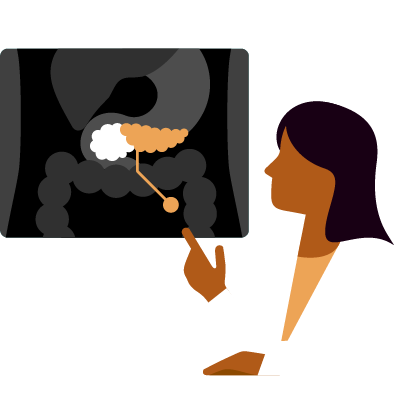Managing the Side Effects of Pancreatic Cancer Treatment

Pancreatic cancer is complex, and as with any cancer, treatment comes with a host of side effects.
If you have pancreatic cancer, it’s very likely that chemotherapy will play a role in your treatment regimen. Designed to stop cancerous cells from growing, dividing, and spreading to other organs, chemotherapy travels through the bloodstream destroying cancerous cells.
“In general, whether patients are scheduled to have surgery or not, they’ll receive one of two treatments: gemcitabine or FOLFIRINOX,” says Laleh Melstrom, M.D., M.S., surgical oncologist at City of Hope, a comprehensive cancer center in Duarte, California, near Los Angeles. Unfortunately, both options also damage healthy cells, and that can lead to side effects ranging from nausea to neuropathy.
Common Side Effects of Treatment
It’s true, cancer treatment comes with a slew of side effects—and FOLFIRINOX in particular is a rigorous and tough-to-tolerate regimen. The good news: There are a number of things patients can do—and medications doctors can prescribe—to counteract the damage.
The most common side effects of treatment and their potential antidotes:
Nausea: It’s no secret that cancer treatment can wreak havoc on your gastrointestinal tract. Chemotherapy squashes the rapidly dividing cells in your digestive tract.
Potential Antidotes: Doctors can mitigate chemotherapy-induced nausea with a variety of prescription medications before, during, and after treatment. Lifestyle strategies, too, can help calm a troubled stomach. Standouts include eating small, frequent meals, sucking on ginger (studies consistently show that ginger helps alleviate nausea) and wearing a pressure bracelet.
Gastrointestinal distress: If you have pancreatic cancer, a variety of factors converge that may inhibit your pancreas’ ability to make digestive enzymes. “Without sufficient pancreatic enzymes, your body can’t absorb fat, so you end up pooping it out,” explains Shaalan Beg, GI cancer specialist at the Harold C. Simmons Comprehensive Cancer Center at University of Texas Southwestern Medical Center in Dallas, Texas.
Potential Antidotes: Supplementing lost enzymes can help minimize symptoms and enhance quality of life. It’s also a good idea to populate your gut with healthy bacteria. “When you have diarrhea, you’re sloughing off the lining of the bowel,” Dr. Melstrom says. “Foods that contain live, active cultures, like plain Greek yogurt, are a natural way to recolonize the bowel.”
Fatigue: Fatigue is the most common side effect of treatment. Chemotherapy can wreak havoc on blood cells and cause anemia—one of the signs of anemia is fatigue. It can last for days or even weeks at a time.
Potential Antidotes: Medical treatment can help boost red blood cells, but the best way to combat fatigue is with lifestyle strategies. It may seem counterintuitive, but exercise is key. “Muscle atrophy happens when you don’t move,” Melstrom says. “It’s difficult to regain that muscle when you’re losing weight.”
It’s also important to stay hydrated (your urine should be clear), eat a healthy diet, get some sun (for the immune-boosting vitamin D), and maintain a solid sleep schedule. Sticking to a regular sleep–wake cycle will not only reduce fatigue, but it may also help keep energy levels high during the daylight hours.
Dry mouth and mouth sores: The inside of your mouth is full of rapidly dividing cells—the same cells that chemotherapy is designed to destroy. FOLFIRINOX, in particular, can cause painful mouth sores (they’re a common side effect of the oxaliplatin component). The other problem: “Pancreatic cancer patients typically don’t eat and drink much so they’re not generating as much saliva,” Melstrom explains.
Potential Antidotes: For dry mouth, your doctor can prescribe a mouthwash that helps generate saliva. Sucking on ginger candy, or any sour candy, can help too. For mouth sores, opt for soft, moist, bland foods over those that are spicy or acidic. Use a straw to drink beverages and increase your protein intake (the amino acids in protein may help mouth sores recover more quickly). If sores are severe, your doctor may choose to reduce or eliminate the oxaliplatin in FOLFIRINOX.
Changes in taste appetite: During treatment, you might no longer find enjoyment in your favorite foods, or you’ll discover that things don’t taste the same. Foods can take on a bland or almost metallic taste. Of course, the degree of nausea and taste changes you experience are unique to your particular cancer and your treatment protocol.
Potential Antidotes: Eat several small meals and focus first on protein. If you can only stomach a spoonful of food, choose something that has a lot of calories like nut butter, fatty fish, or avocadoes. Still can’t eat? Appetite-stimulating medications may help.
Neuropathy:Neuropathy happens when nerve endings are damaged. You might notice an unpleasant tingling or numbness, usually in the hands or feet. While neuropathy typically resolves after treatment, some patients have residual long-term effects.
Potential Antidotes: If you’re experiencing severe neuropathy, your doctor may choose to modify your treatment regimen or prescribe medications such as steroids, topical numbing agents, or antiseizure medications, among others. If the neuropathy is manageable, make sure to protect your hands and feet. Wear gloves and cotton socks and avoid tight-fitting shoes and hot and cold temperatures.
Pain: The pain from pancreatic cancer can be mild or severe and constant or intermittent. The culprit may be the disease itself (from tumor spread to the network of nerves surrounding the pancreas) or a side effect of treatment.
Potential Antidotes: Pain management may include everything from medication and physical therapy to meditation and cannabis. “One thing I tell patients is that we have more options than ever before to mitigate pain,” Melstrom says, “If you feel like you need a higher dose or a different pain treatment regimen, talk to your doctor about your options.”
Toward Reduced Toxicities
No matter which type of chemotherapy you’re on, whether before or after surgery, or on its own, it’s important to keep the lines of communication open with your doctor. If side effects are interfering with your health or quality of life, there are a number of things doctors and patients can do to minimize the toxicities.
On the physician side:
- Discontinue treatment for a brief time period
- Reduce the dose
- Prescribe medications to mitigate side effects
On the patient side:
- Exercise: The single most important thing you can do to alleviate side effects is to get moving.
- Eat well: While nausea may interfere with your ability to eat a healthful diet, it’s important to make sure that you’re getting enough protein to prevent wasting.
- Self-care: Practicing meditation, yoga, or deep breathing can help lift your spirits and boost energy levels to help battle the disease.
“The best way to manage side effects is to anticipate them and treat them preemptively,” Melstrom notes. And doctors have more tools in their arsenal than ever before to mitigate the side effects of treatment.






